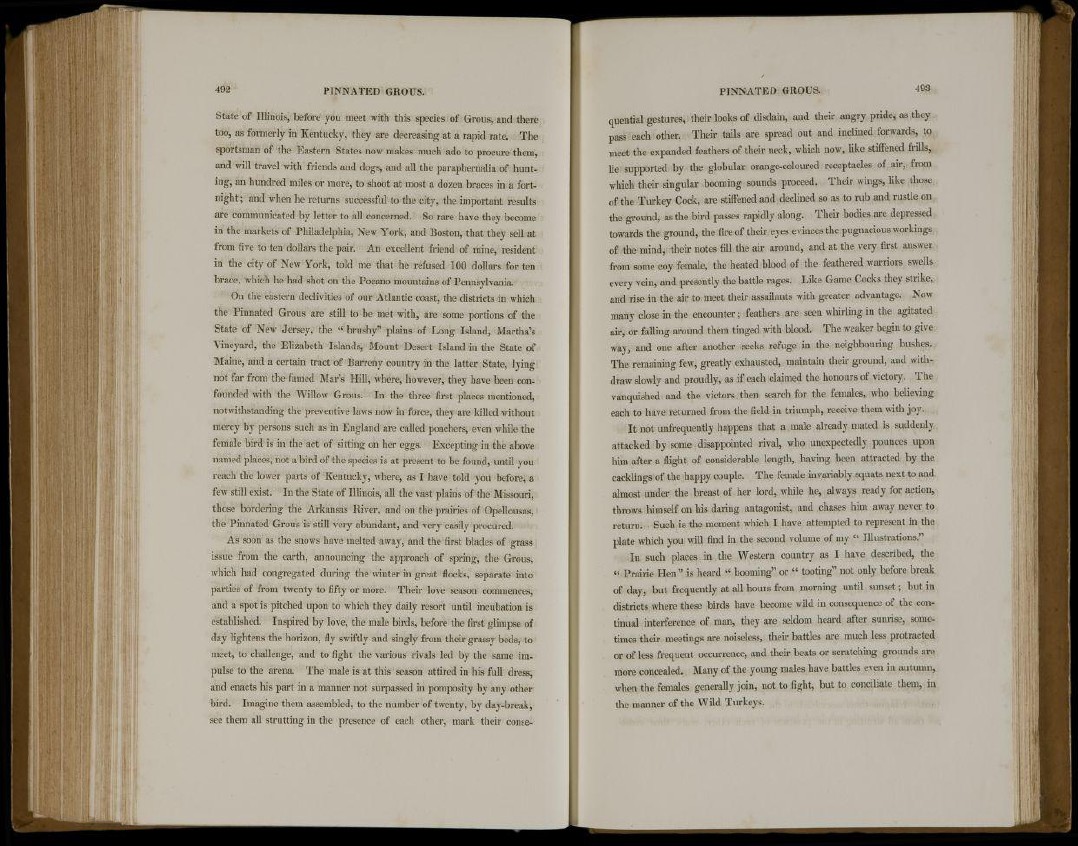
State of Illinois, before you meet with this species of Grous, and there
too, as formerly in Kentucky, they are decreasing at a rapid rate. The
sportsman of the Eastern States now makes much ado to procure them,
and will travel with friends and dogs, and all the paraphernalia of hunting,
an hundred miles or more, to shoot at most a dozen braces in a fortnight
; and when he returns successful to the city, the important results
are communicated by letter to all concerned. So rare have they become
in the markets of Philadelphia, New York, and Boston, that they sell at
from five to ten dollars the pair. An excellent friend of mine, resident
in the city of New York, told me that he refused 100 dollars for ten
brace, which he had shot on the Pocano mountains of Pennsylvania.
On the eastern declivities of our Atlantic coast, the districts in which
the Pinnated Grous are still to be met with, are some portions of the
State of New Jersey, the " brushy'1 plains of Long Island, Martha's
Vineyard, the Elizabeth Islands, Mount Desert Island in the State of
Maine, and a certain tract of Barreny country in the latter State, lying
not far from the famed Mar's Hill, where, however, they have been confounded
with the Willow Grous. In the three first places mentioned,
notwithstanding the preventive laws now in force, they are killed without
mercy by persons such as in England are called poachers, even while the
female bird is in the act of sitting on her eggs. Excepting in the above
named places, not a bird of the species is at present to be found, until you
reach the lower parts of Kentucky, where, as I have told you before, a
few still exist. In the State of Illinois, all the vast plains of the Missouri,
those bordering the Arkansas River, and on the prairies of Opellousas,
the Pinnated Grous is still very abundant, and very easily procured.
As soon as the snows have melted away, and the first blades of grass
issue from the earth, announcing the approach of spring, the Grous,
which had congregated during the winter in great flocks, separate into
parties of from twenty to fifty or more. Their love season commences,
and a spot is pitched upon to which they daily resort until incubation is
established. Inspired by love, the male birds, before the first glimpse of
day lightens the horizon, fly swiftly and singly from their grassy beds, to
meet, to challenge, and to fight the various rivals led by the same impulse
to the arena. The male is at this season attired in his full dress,
and enacts his part in a manner not surpassed in pomposity by any other
bird. Imagine them assembled, to the number of twenty, by day-break,
see them all strutting in the presence of each other, mark their comequential
gestures, their looks of disdain, and their angry pride, as they
pass each other. Their tails are spread out and inclined forwards, to
meet the expanded feathers of their neck, which now, like stiffened frills,
lie supported by the globular orange-coloured receptacles of air, from
which their singular booming sounds proceed. Their wings, like those
of the Turkey Cock, are stiffened and declined so as to rub and rustle on
the ground, as the bird passes rapidly along. Their bodies are depressed
towards the ground, the fire of their eyes evinces the pugnacious workings
of the mind, their notes fill the air around, and at the very first answer
from some coy female, the heated blood of the feathered warriors swells
every vein, and presently the battle rages. Like Game Cocks they strike,
and rise in the air to meet their assailants with greater advantage. Now
many close in the encounter; feathers are seen whirling in the agitated
air, or falling around them tinged with blood. The weaker begin to give
way, and one after another seeks refuge in the neighbouring bushes.
The remaining few, greatly exhausted, maintain their ground, and withdraw
slowly and proudly, as if each claimed the honours of victory. The
vanquished and the victors then search for the females, who believing
each to have returned from the field in triumph, receive them with joy.
It not unfrequently happens that a male already mated is suddenly
attacked by some disappointed rival, who unexpectedly pounces upon
him after a flight of considerable length, having been attracted by the
cacklings of the happy couple. The female invariably squats next to and
almost under the breast of her lord, while he, always ready for action,
throws himself on his daring antagonist, and chases him away never to
return. Such is the moment which I have attempted to represent in the
plate which you will find in the second volume of my " Illustrations."
In such places in the Western country as I have described, the
" Prairie Hen " is heard *' booming" or " tooting" not only before break
of day, but frequently at all hours from morning until sunset; but in
districts where these birds have become wild in consequence of the continual
interference of man, they are seldom heard after sunrise, sometimes
their meetings are noiseless, their battles are much less protracted
or of less frequent occurrence, and their beats or scratching grounds are
more concealed. Many of the young males have battles even in autumn,
when the females generally join, not to fight, but to conciliate them, in
the manner of the Wild Turkeys.